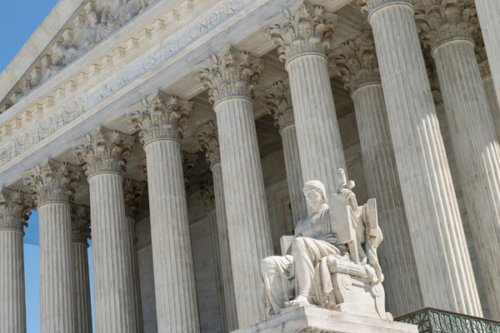Cambridge, MA—As the Supreme Court is poised to hand down perhaps its most consequential raft of decisions in a generation, a new study published this week in the Proceedings of the National Academy of Sciences finds that since 2020, the court has become much more conservative than the American public at large. Leveraging a decade-long set of surveys that ask Americans about the exact issues before the court, Stephen Jessee from the University of Texas at Austin, Neil Malhotra from the Stanford Graduate School of Business, and Harvard Kennedy School’s Maya Sen demonstrate that the Supreme Court is now ideologically further to the right than roughly three quarters of Americans.
The authors’ research illustrates how new appointments over the last decade have corresponded with rightward shifts in the court’s ideology. The 2018 replacement of moderate conservative Justice Anthony Kennedy with the more conservative Brett Kavanaugh shifted the court’s politics strongly to the right. “In 2010, with Kennedy as the median, the court’s rulings put it in an ideological middle ground roughly halfway between Republicans and Democrats. In fact, the estimated ideological position of the court with Kennedy as the median falls almost exactly at the position of the average American.”
The October 2020 appointment of Amy Coney Barrett to fill the vacancy left by the death of Justice Ruth Bader Ginsburg resulted in the court’s ideology moving even further to the right, according to the authors. Though many believe that Chief Justice Roberts held the court’s moderate center together following Justice Kennedy’s retirement, Justice Barrett’s appointment signaled the end of the court’s centrism by increasing the size of the conservative voting bloc from 5 to 6 (out of 9). This has resulted in rulings that are more conservative than what most Americans prefer. “Indeed, by the time of our 2021 survey, the following April, the court is estimated to be significantly more conservative than the average American,” the authors write.
This sudden rightward shift, which now finds Justice Brett Kavanaugh occupying the court’s median ideological position, has led much of the public to underestimate the court’s conservative tilt. Democrats in particular, according to the survey data compiled by the authors, are “particularly likely to consistently underestimate the court’s conservative lean.” This underestimation of the court’s sharp turn to the right has significant consequences for the public’s support for Supreme Court reforms, such as term limits or the appointment of additional justices. “The fact that so many people currently underestimate how conservative the court is implies that support for proposed changes to the court may be weaker than it would be if people knew with greater accuracy the court’s conservative nature.”
About the Ash Center
The Ash Center for Democratic Governance and Innovation at Harvard Kennedy School advances excellence in governance and strengthens democratic institutions worldwide. Through its research, education, international programs, and government innovations awards, the Center fosters creative and effective government problem solving and serves as a catalyst for addressing many of the most pressing needs of the world’s citizens.
Contact



